九年级英语Unit1短语句型教案
- 格式:docx
- 大小:13.95 KB
- 文档页数:4
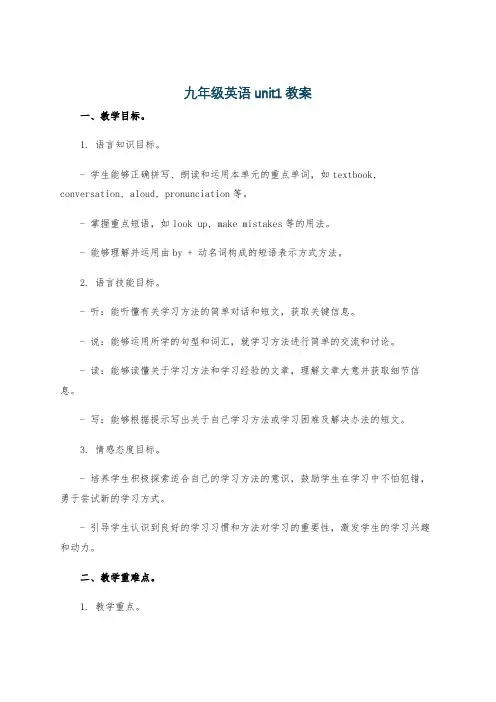
九年级英语unit1教案一、教学目标。
1. 语言知识目标。
- 学生能够正确拼写、朗读和运用本单元的重点单词,如textbook, conversation, aloud, pronunciation等。
- 掌握重点短语,如look up, make mistakes等的用法。
- 能够理解并运用由by + 动名词构成的短语表示方式方法。
2. 语言技能目标。
- 听:能听懂有关学习方法的简单对话和短文,获取关键信息。
- 说:能够运用所学的句型和词汇,就学习方法进行简单的交流和讨论。
- 读:能够读懂关于学习方法和学习经验的文章,理解文章大意并获取细节信息。
- 写:能够根据提示写出关于自己学习方法或学习困难及解决办法的短文。
3. 情感态度目标。
- 培养学生积极探索适合自己的学习方法的意识,鼓励学生在学习中不怕犯错,勇于尝试新的学习方式。
- 引导学生认识到良好的学习习惯和方法对学习的重要性,激发学生的学习兴趣和动力。
二、教学重难点。
1. 教学重点。
- 重点单词、短语和句型的学习与运用。
- 理解并掌握by + 动名词结构表示方式方法的用法。
2. 教学难点。
- 能够运用所学知识,针对不同的学习问题提出有效的解决方法。
- 如何引导学生在实际生活中运用正确的学习方法提高学习效率。
三、教学方法。
1. 情景教学法。
通过创设各种与学习方法相关的情景,让学生在真实的语境中学习和运用英语。
2. 任务驱动法。
布置各种任务,如小组讨论、角色扮演、写作任务等,让学生在完成任务的过程中提高语言综合运用能力。
3. 交际教学法。
鼓励学生之间进行交流和互动,培养学生的英语口语表达能力和交际能力。
四、教学过程。
(一)导入(5分钟)1. 展示一些名人学习的图片,如爱因斯坦、居里夫人等,然后提问学生:“What do you think made them successful in their study?”引导学生思考成功学习的因素,从而引出本节课的话题——如何成为好的学习者。
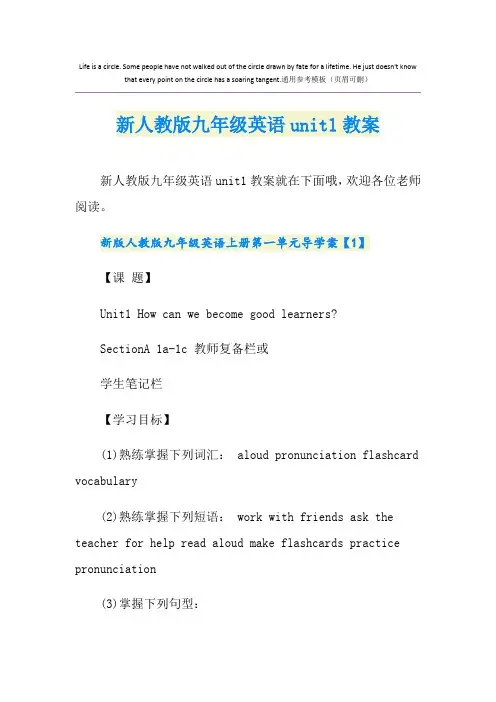
Life is a circle. Some people have not walked out of the circle drawn by fate for a lifetime. He just doesn't know that every point on the circle has a soaring tangent.通用参考模板(页眉可删)新人教版九年级英语unit1教案新人教版九年级英语unit1教案就在下面哦,欢迎各位老师阅读。
新版人教版九年级英语上册第一单元导学案【1】【课题】Unit1 How can we become good learners?SectionA 1a-1c 教师复备栏或学生笔记栏【学习目标】(1)熟练掌握下列词汇: aloud pronunciation flashcard vocabulary(2)熟练掌握下列短语: work with friends ask the teacher for help read aloud make flashcards practice pronunciation(3)掌握下列句型:--- How do you study for a test? --- I study by working with a group.【学习重点难点】掌握SectionA 1a-1c所有重点单词,短语和句型。
难点:介词by引导的方式状语的合理运用。
【学法指导】预习---听说---听力---对话—朗读---作业运用已有学习经验【教学过程】【教学过程】一、导入(启发探究 3分钟)How do you study for an English test? Maybe you have many different ways, now check() the ways you use in 1a. Then add other ways you sometimes use.二、自学(自主探究 6分钟)读一读,写一写aloud pronunciation flashcard vocabulary读一读,译一译make flashcards _______________work with friends _____________ask the teacher for help ______________read aloud _________________by making vocabulary lists _____________三、交流(合作探究 10分钟)同桌结对练习1a句型Work in pairs. Ask your partner how he or she studies for a test.eg: A: How do you study for a test?B: I study by working with a group.by makingflashcardsby working with friendsby asking the teacher for helpby reading aloudby making vocabulary lists同桌结对完成1b Listen. 并核对答案How do these students study for a test? Write letters from 1a above.小组合作完成1cMake conversations about how you study for a test四、总结(引深探究 15分钟)语法学习by+Ving( 1)by①—How do you study for a test? I study by working witha group.② We usually go to school by bike.③English is spoken by many people.by的意思是“通过……的方式”时,后接 ;当表示“乘坐”时,后跟 ;它还可以表示,用于被动语态,引导出动作的发出者。

Unit 1 Stay Healthy Lesson 1: What’s Wrong, Danny?stomach, regret, fever, pale, Sara, examination, pain, X-rayII. Learning important and difficult points:1) Danny wakes up his parents.2) I regret eating so many donuts now.3) Need we go there right now?4) She takes them to a small examination room.5) Danny needs to stay in the hospital today.Language Points:1. regret【用法】作及物动词,意为“对……感到后悔”,后加名词、代词、动名词作宾语。
【举例】①Tony has been regretting that matter. 托尼对那件事情一直感到很后悔。
②I regret making such a foolish decision. 我后悔做出这么愚蠢的决定。
【用法】作不可数名词,意为“遗憾、惋惜”。
【举例】His great regret is not seeing his father for the last time. 他最大的遗憾是没有能最后一次见他父亲一面。
2. Danny wakes up his parents. 丹尼把他的父母叫醒了。
【用法】短语wake up意为“叫醒”,这是“动词+副词”短语。
这类短语用名词作宾语时,名词可在副词前,也可用在副词后;如用代词作宾语时,代词则必须用在副词前。
故这句话中的wake up his parents 还可说为wake his parents up。
【举例】Mum, will you please wake me up at five tomorrow morning? 妈妈,你能在明天早晨五点钟叫醒我吗?【拓展】wake up也可不带宾语,意为“醒来”。

Unit 1How can we become good learners?Section A (1a-2d)1.重点单词:textbook,conversation,aloud,pronunciation,sentence2.重点短语:make word cards,work with friends,ask the teacher for help,listen to tapes,speaking skills,word by word,be patient3.重点句式:How can we become good learners?—How do you study for a test?—I study by working with a group.What about reading aloud to practice pronunciation?It's too hard to understand spoken English.—Have you ever studied with a group?—Yes,I have.I've learned a lot that way.Try to guess a word's meaning by reading the sentences before and after it.You can become better by reading something you enjoy every day.The more you read,the faster you'll be.1.重点短语和句型2.How对方式进行提问及用by+doing回答How对方式进行提问及用by+doing 回答一、预习课本P1-2新单词并背诵,完成下面的汉译英。
1.课本____________ 2.交谈____________3.大声地____________ 4.发音(n.)____________5.句子____________ 6.有耐心的____________二、认真预习1a-2d找出下列短语和句型。
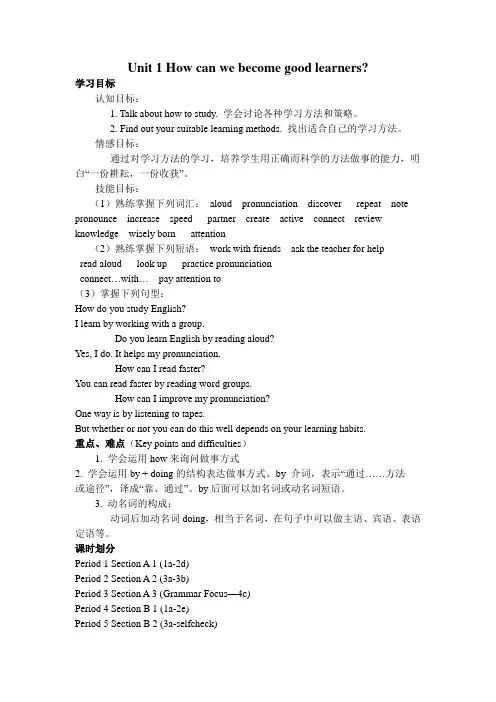
Unit 1 How can we become good learners?学习目标认知目标:1. Talk about how to study. 学会讨论各种学习方法和策略。
2. Find out your suitable learning methods. 找出适合自己的学习方法。
情感目标:通过对学习方法的学习,培养学生用正确而科学的方法做事的能力,明白“一份耕耘,一份收获”。
技能目标:(1)熟练掌握下列词汇:aloud pronunciation discover repeat note pronounce increase speed partner create active connect review knowledge wisely born attention(2)熟练掌握下列短语:work with friends ask the teacher for helpread aloud look up practice pronunciationconnect…with…pay attention to(3)掌握下列句型:How do you study English?I learn by working with a group.Do you learn English by reading aloud?Yes, I do. It helps my pronunciation.How can I read faster?You can read faster by reading word groups.How can I improve my pronunciation?One way is by listening to tapes.But whether or not you can do this well depends on your learning habits.重点、难点(Key points and difficulties)1. 学会运用how来询问做事方式2. 学会运用by + doing的结构表达做事方式。
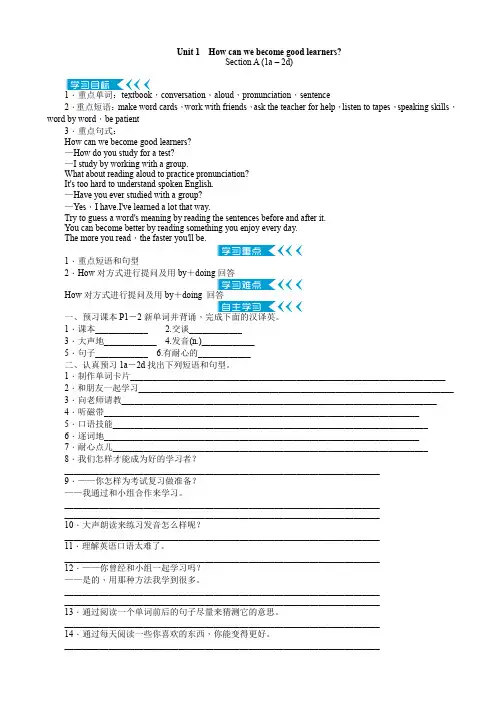
Unit 1How can we become good learners?Section A (1a-2d)1.重点单词:textbook,conversation,aloud,pronunciation,sentence2.重点短语:make word cards,work with friends,ask the teacher for help,listen to tapes,speaking skills,word by word,be patient3.重点句式:How can we become good learners?—How do you study for a test?—I study by working with a group.What about reading aloud to practice pronunciation?It's too hard to understand spoken English.—Have you ever studied with a group?—Yes,I have.I've learned a lot that way.Try to guess a word's meaning by reading the sentences before and after it.You can become better by reading something you enjoy every day.The more you read,the faster you'll be.1.重点短语和句型2.How对方式进行提问及用by+doing回答How对方式进行提问及用by+doing 回答一、预习课本P1-2新单词并背诵,完成下面的汉译英。
1.课本____________ 2.交谈____________3.大声地____________ 4.发音(n.)____________5.句子____________ 6.有耐心的____________二、认真预习1a-2d找出下列短语和句型。
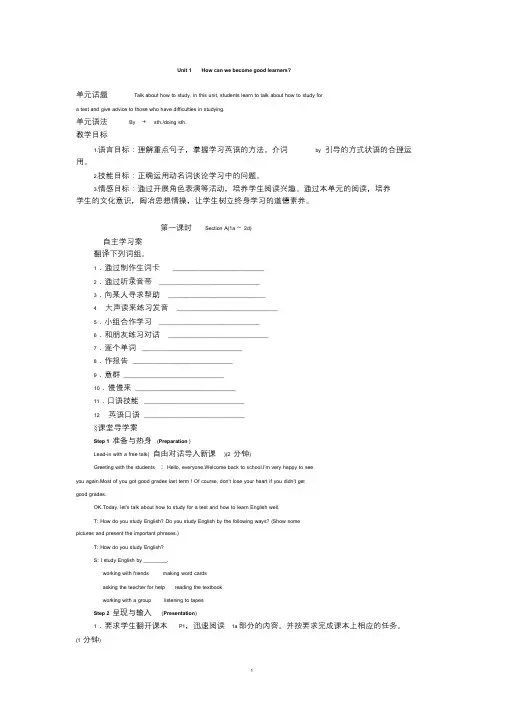
Unit 1 How can we become good learners?单元话题Talk about how to study, in this unit, students learn to talk about how to study for a test and give advice to those who have difficulties in studying.单元语法By +sth./doing sth.教学目标1.语言目标:理解重点句子,掌握学习英语的方法。
介词by 引导的方式状语的合理运用。
2.技能目标:正确运用动名词谈论学习中的问题。
3.情感目标:通过开展角色表演等活动,培养学生阅读兴趣。
通过本单元的阅读,培养学生的文化意识,陶冶思想情操,让学生树立终身学习的道德素养。
第一课时Section A(1a~2d)自主学习案翻译下列词组。
1.通过制作生词卡________________________________2.通过听录音带___________________________________3.向某人寻求帮助__________________________________4 大声读来练习发音___________________________________5.小组合作学习___________________________________6.和朋友练习对话___________________________________7.逐个单词___________________________________8.作报告___________________________________9.意群___________________________________10.慢慢来___________________________________11.口语技能___________________________________12 英语口语___________________________________§课堂导学案Step 1 准备与热身(Preparation )Lead-in with a free talk( 自由对话导入新课)(2 分钟)Greeting with the students :Hello, everyone.Welcome back to school.I'm very happy to see you again.Most of you got good grades last term ! Of course, don't lose your heart if you didn't get good grades.OK.Today, let's talk about how to study for a test and how to learn English well.T: How do you study English? Do you study English by the following ways? (Show some pictures and present the important phrases.)T: How do you study English?S: I study English by ________.working with friends making word cardsasking the teacher for help reading the textbookworking with a group listening to tapesStep 2 呈现与输入(Presentation)1.要求学生翻开课本P1,迅速阅读1a 部分的内容。
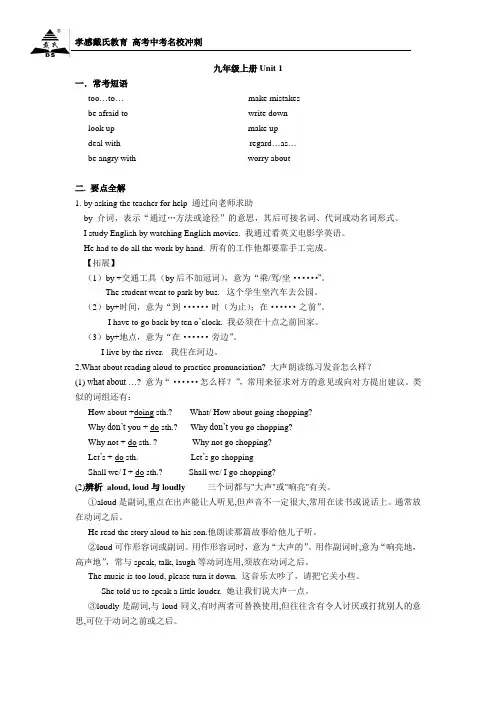
九年级上册Unit 1一.常考短语too…to… _______________ make mistakes _________________be afraid to ______________ write down ____________________look up _________________ make up ______________________deal with ________________ regard…as… __________________be angry with ____________ worry about ____________________二. 要点全解1. by asking the teacher for help 通过向老师求助by 介词,表示“通过…方法或途径”的意思,其后可接名词、代词或动名词形式。
I study English by watching English movies. 我通过看英文电影学英语。
He had to do all the work by hand. 所有的工作他都要靠手工完成。
【拓展】(1)by +交通工具(by后不加冠词),意为“乘/驾/坐······”。
The student went to park by bus. 这个学生坐汽车去公园。
(2)by+时间,意为“到······时(为止);在······之前”。
I have to go back by ten o’clock. 我必须在十点之前回家。
(3)by+地点,意为“在······旁边”。
I live by the river. 我住在河边。
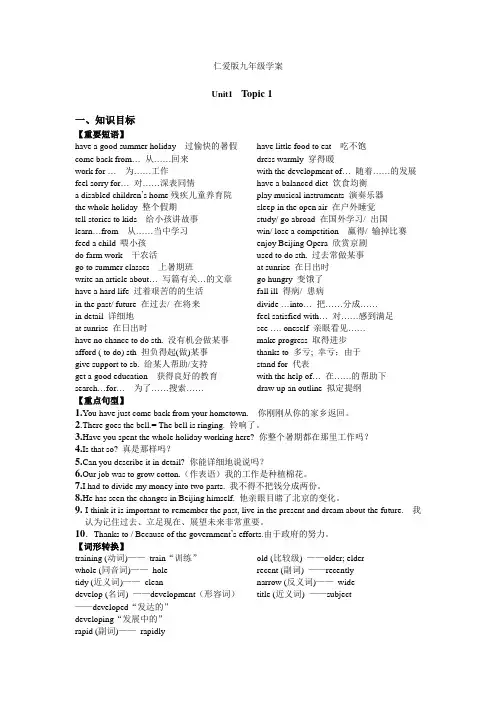
仁爱版九年级学案Unit1 Topic 1一、知识目标【重要短语】have a good summer holiday 过愉快的暑假come back from…从……回来work for …为……工作feel sorry for…对……深表同情a disabled children’s home残疾儿童养育院the whole holiday 整个假期tell stories to kids 给小孩讲故事learn…from 从……当中学习feed a child 喂小孩do farm work 干农活go to summer classes 上暑期班write an article about…写篇有关…的文章have a hard life 过着艰苦的的生活in the past/ future 在过去/ 在将来in detail 详细地at sunrise 在日出时have no chance to do sth. 没有机会做某事afford ( to do) sth 担负得起(做)某事give support to sb. 给某人帮助/支持get a good education 获得良好的教育search…for…为了……搜索……have little food to eat 吃不饱dress warmly 穿得暖with the development of…随着……的发展have a balanced diet 饮食均衡play musical instruments 演奏乐器sleep in the open air 在户外睡觉study/ go abroad 在国外学习/ 出国win/ lose a competition 赢得/ 输掉比赛enjoy Beijing Opera 欣赏京剧used to do sth. 过去常做某事at sunrise 在日出时go hungry 变饿了fall ill 得病/ 患病divide …into…把……分成……feel satisfied with…对……感到满足see …. oneself 亲眼看见……make progress 取得进步thanks to 多亏; 幸亏;由于stand for 代表with the help of…在……的帮助下draw up an outline 拟定提纲【重点句型】1.You have just come back from your hometown. 你刚刚从你的家乡返回。
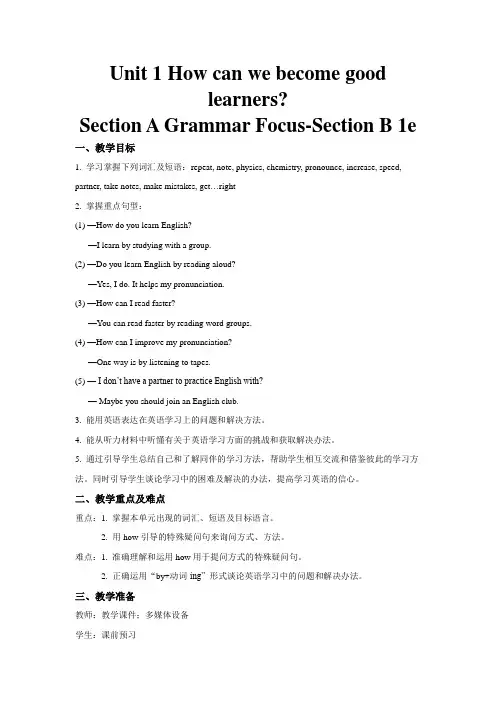
Unit 1 How can we become goodlearners?Section A Grammar Focus-Section B 1e一、教学目标1. 学习掌握下列词汇及短语:repeat, note, physics, chemistry, pronounce, increase, speed, partner, take notes, make mistakes, get…right2. 掌握重点句型:(1) —How do you learn English?—I learn by studying with a group.(2) —Do you learn English by reading aloud?—Yes, I do. It helps my pronunciation.(3) —How can I read faster?—You can read faster by reading word groups.(4) —How can I improve my pronunciation?—One way is by listening to tapes.(5) —I don’t have a partner to practice English with?— Maybe you should join an English club.3. 能用英语表达在英语学习上的问题和解决方法。
4. 能从听力材料中听懂有关于英语学习方面的挑战和获取解决办法。
5. 通过引导学生总结自己和了解同伴的学习方法,帮助学生相互交流和借鉴彼此的学习方法。
同时引导学生谈论学习中的困难及解决的办法,提高学习英语的信心。
二、教学重点及难点重点:1. 掌握本单元出现的词汇、短语及目标语言。
2. 用how引导的特殊疑问句来询问方式、方法。
难点:1. 准确理解和运用how用于提问方式的特殊疑问句。
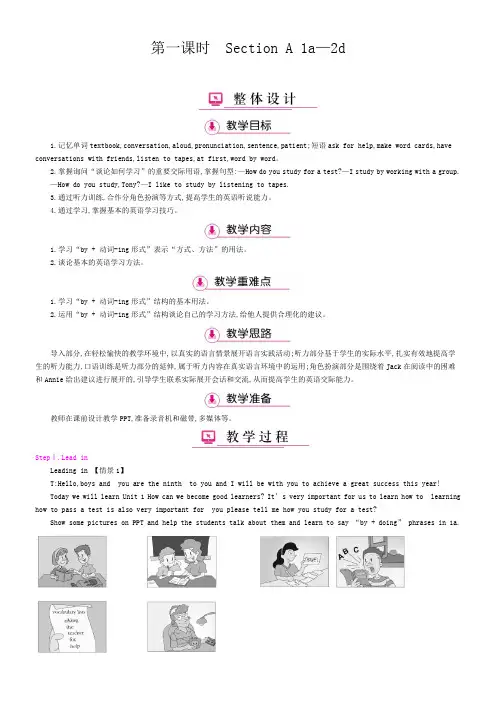
第一课时Section A 1a—2d1.记忆单词textbook,conversation,aloud,pronunciation,sentence,patient;短语ask for help,make word cards,have conversations with friends,listen to tapes,at first,word by word。
2.掌握询问“谈论如何学习”的重要交际用语,掌握句型:—How do you study for a test?—I study by working with a group.—How do you study,Tony?—I like to study by listening to tapes.3.通过听力训练,合作分角色扮演等方式,提高学生的英语听说能力。
4.通过学习,掌握基本的英语学习技巧。
1.学习“by + 动词-ing形式”表示“方式、方法”的用法。
2.谈论基本的英语学习方法。
1.学习“by + 动词-ing形式”结构的基本用法。
2.运用“by + 动词-ing形式”结构谈论自己的学习方法,给他人提供合理化的建议。
导入部分,在轻松愉快的教学环境中,以真实的语言情景展开语言实践活动;听力部分基于学生的实际水平,扎实有效地提高学生的听力能力,口语训练是听力部分的延伸,属于听力内容在真实语言环境中的运用;角色扮演部分是围绕着Jack在阅读中的困难和Annie给出建议进行展开的,引导学生联系实际展开会话和交流,从而提高学生的英语交际能力。
教师在课前设计教学PPT,准备录音机和磁带,多媒体等。
StepⅠ.Lead inLeading in 【情景1】T:Hello,boys and you are the ninth to you and I will be with you to achieve a great success this year!Today we will learn Unit 1 How can we become good learners? It’s very important for us to learn how to learning how to pass a test is also very important for you please tell me how you study for a test?Show some pictures on PPT and help the students talk about them and learn to say “by + doing” phrases in 1a.The following language points should be explained.[设计意图]通过PPT课件和图片提示,努力创造更加真实的语言交际情景,让学生围绕本单元的中心话题“谈论如何学习”进行学习和知识积累,学习运用目标语言知识进行初步交流,帮助学生更好地了解他人和反思自己的学习方式。
九年级英语 unit1 教课方案【篇一:人教版九年级英语上册unit1 教课方案】人教版九年级英语上册教课方案unit 1 how can we become good learners ? 单元计划单元学习目标:1.能写出本单元的常用词汇和要点短语2.能正确运用how 来咨询做事方式,运用by +doing 的构造表达做事方式,3能描绘学习英语的方法,解决英语学习中的一些困难;学会解决生活的问题.单元重难点:1)能正确运用 how 来咨询做事方式,运用 by +doing 的构造表达做事方式,2)能描绘学习英语的方法,解决英语学习中的一些困难;学会解决生活的问题.1.要点词汇和短语大声地 _______ 发音 __________认识到;认识到_________快速地_______责任;义务_________ 影响 _________ 除非 _________ 使感人;使印象深刻_________范错;犯错__________ 此后;随后___________ 没关系___________惧怕去做__________嘲讽___________ 做笔录_____________ 查阅;查找___________ 办理;对付 __________将。
视为_____________生某人的气 _______________(指时间)过去____________全力做。
___________中断;忽然中断 ____________ 假造;构成 _____________结束做某事 _____________ 第一 __________________2.要点句型翻译1)你是如何准备考试的?我和朋友们一同学习。
2)你以前参加过学习小组吗?是的,参加过。
经过这类方式我学了很多。
3)我没有伙伴能够练习英语。
也许,你应当参加一个英语俱乐部。
4)大声朗诵来练习发音怎么样?你为何不参加一个英语俱乐部呢?5)为何你不参加英语俱乐部来练习你的英语呢?6)在老师的帮助下尽最大努力去学习是我们的职责。
人教版初中英语九年级全册《Unit 1 How can we Section B 2a3b 》优质课公开课课件、教案人教版九年级英语unit1复习导学案【复习目标】一、熟练掌握下列词汇: aloud pronunciation discover pronounce create active connect knowledge wisely born attention二、熟练掌握下列短语: ask the teacher for help look up be bornwith connect…with… pay attention to三、掌握下列句型:1. Because I wanted to understand thestory , I looked them up in a dictionary.2. Everyone is born with the ability to learn.3. Studies show that if you are interested in something, your brain is more active and it is also easier for you to pay attention to it for a long time.4. Good learners often connect what they need tolearn with something interesting.【重点、难点】1. 掌握how来询问做事方式。
2.掌握by+doing的结构表达做事方式。
by介词,表示“通过……方法或途径”,译成“靠、通过”。
by后面可以加名词或动名词短语。
3. 动名词的构成:动词后加动名词doing,相当于名词,在句子中可以做主语、宾语、表语定语等。
【知识梳理】1. I ___________ ask questions __________ my poor pronunciation.2. I ____________________________ this exciting and funny movie!3. So I _________________ watch other English movies, too.4. I _________ them ________ in a dictionary.5. I want to learn new words and more grammar so that I can___________________English movies.6. Everyone ___________________ the ability to learn.7. But whether or not you can do this well _________________ your learning habits.8. Research shows that successful learners have some good habits_____________________.9. Studies show that if you are interested in something , your brain is more active and it is also easier for you to ____________________ it for a long time. 10. _____________________ , they may _________________ by__________________ key words or by drawing mind maps.11. They also ___________________ ways to review what they have learned.12. Good learners often _______________ what they need to learn___________ something interesting.13. Knowledge _____________________ questioning.【重难点讲解】1. By asking the teacher for help.介词by 的用法:(1)、表示方式、方法或手段,后接名词或动名词,意为“使用某物;靠;乘(车船)等”。
Unit1 How do you study for a test ?Section A短语:1. 听磁带 2、向教师请教3、生气4、看英语录像5、写英语日记6、大声朗读7、练习发音 8、参加英语俱乐部9、做某事地最佳方式10、感觉不同11、根本不 12、对……感到兴奋13、结束,告终句子1、--你是如何为考试作准备地? ----我通过听磁带来学习.--- do you ?---I study tapes.2、太难理解那些声音了.It’s hard understand the voices.3、然而,有时他发现看电影让人感到灰心,因为人们讲话太快了.Sometimes, however ,he watching movies because the people speak too quickly .4、她补充说,跟朋友交谈毫无帮助.She added that conversations with friends was not helpful.5、我们经常谈到某些事情时,变得很激动,然后就讲起中文来了.We oftensomething and then in Chinese .知识点讲解:1. by asking the teacher for help(P2)通过向老师寻求帮助(1)“ask+sb+for+名词”意为“向某人请求……”;“向某人要求……”.They asked me for .他们向我求助.We asked our PE teacher for a football.我们请求体育老师给我们一个足球.(2)by作介词时,后接动词-ing形式,这是中考地重点,大家可不要忘记啊!◎“通过……地方式”.Mr Green makes a living by teaching.格林先生以教书为生.◎“经过(某人/某物)”.He went by the supermarket on his way to school.在去上学地路上,他经过那家超市.◎“在……旁边,在……附近”.Li Lei sits by my side in the classroom.在教室里,李雷坐在我地旁边.◎“在……之前,不迟于……”.I can finish doing my homew ork by six o’clock. 我能在6点之前做完作业.◎表示交通方式,意为“乘……”.I usually go to school by bike. 我通常骑自行车去上学.复习一下一个常用短语:by the way “顺便说一下”.用于转移话题.By the way, I forgot to tell you the news. 哦,对了,我忘记告诉你那个消息了.2、It’s too hard to understand the voices . (p3)很难理解这些对话.too…to 太……而不能... 常和so….that+从句转换,也可以跟not…enough to do 连用.试做:He is too careless to work it out .(变成同义句)He is sothat work it out .He is not enough work it out .3、He’s been learning English for six years and really loves it. (P4)他已经学了六年地英语,而且地确很喜欢它.He’s是He has地缩写.这是一个现在完成进行时态地句子,由“助动词have/has+been+现在分词”构成,用来表示动作从过去某一时间开始,一直延续到现在,可能还要延续下去.请翻译:格林先生已经卧床两个星期了.Mr Green(lie) in bed for two weeks.我们在这所学校教书已经8年半了.We have been teaching in this school .4、 She added that having conversations with friends was not helpful at all. (P4)她补充说,和朋友交谈一点帮助都没有.(1)add地常见意思为“增加,添上,加上”.在本句中表示在说完上面地话语后又添加一些话语,是“又说,补充说”地意思.It will add to your troubles. 这将会给你们增添麻烦地.Mr Smith added that he would be back soon. 史密斯先生补充说他很快就会回来.(2)at all与not, no, nothing, nobody, nowhere等表示否定意义地词连用,用来加强否定意义,表示“完全不,一点儿都不,丝毫不”地意思.He doesn’t like swimming at all.他一点儿都不喜欢游泳.There is nothing in the room at all.房间里面什么东西都没有.◎not at all单独使用时,用来回答对方地感谢或道歉,相当于That’ s all right, You’re welcome等.但是,You’re welcome主要用于美国英语中,而英国人则多用Not at all.—Thank you very much for your help.非常感谢你地帮助!—Not at all./That’ s all right./You’re welcome.别客气.5. We get excited about something and then end up speaking in Chinese. (P4)有些话题让我们兴奋不已,最后干脆说起汉语来.(1)be/get excited about意思是“对…感到兴奋”,其中about后可接名词、代词或动词-ing形式. She got excited about it as soon as she heard the good news.她一听到那个好消息,就变得很兴奋.Are you excited about going to Shanghai? 你对去上海感到兴奋吗?类似短语be/get worried about “对…感到担心”,be amazed at“对…感到惊讶”,be pleased with“对…感到满意”.(2)excited表示某人对某物或某事“感到兴奋,激动”,主语常为人.We were excited when we saw our team was winning.看到自己地球队要赢了,我们都十分激动.注意:exciting作“令人激动地”,“令人兴奋地”解时,常用来修饰物或事.The football match we watched was very exciting.我们观看地那场足球赛非常激动人心.(3)end up意为“达到某状态或采取某行动,以……结束或告终”,后面接动词-ing形式.He ended up running a firm. 他最终经营了一家公司.类似短语:eat up“吃光”, burn up“烧光”.Section B短语1、口语2、在….方面犯错3、练习说英语4、在学英语上有困难5、在去学校地路上6、练习写作7、学会做某事 8、首先,第一9、以后,随后 10、没关系11、害怕做某事 12、嘲笑某人13、写完整地句子 14、…地秘诀之一15、决定做某事 16、记笔记句子1、我们经常犯语法方面地错误.I always grammar .2、我不知道怎样使用逗号.I don’t know commas .3、我没有一个一起练英语地伙伴.I don’t have a partner practice English .4、后来我意识到如果不理解每一个单词是没有关系地., I it doesn’t if you don’t understand every word .5、我以前也害怕在课堂上说英语,因为我认为同学们可能会嘲笑我.I was alsospeak in class ,because I thought my classmates might me .知识点讲解1. Maybe you should join an English language club. (P5)也许你应该参加某个英语俱乐部.(1)maybe和may be虽然写法相似,意思也相似,但是用法区别很大.maybe是副词,意为“也许,可能”,用作状语;may be意为“也许是,可能是”,may是情态动词,与be一起作谓语.Maybe you put it there. 也许你把它放在那里了.But I’m afraid I may be a li ttle late. 但恐怕我可能是晚了一点.(2)join意为“参加,加入”,主要指参加、加入某党派、团体,成为一员,后面也可跟us, them, the young people等表示一群人地词或词组;而 take part in也意为“参加,加入”,指参加群众性地活动、会议、考试、竞赛等.My brother joined the League two years ago. 我地哥哥两年前就入团了.We are getting ready to take part in the speech contest.我们正准备参加这次演讲比赛.2. First of all, it wasn’t easy for me to understand the teacher when she talked to the class. (P6)刚开始,当老师和全班学生说话地时候,她地话对我来说很难听懂.(1)短语first of all意为“首先,第一”,在句中作状语,强调首要地事情是什么,不一定用于列举,常用于first of all..., then..., at last...,使说明地层次更清楚.First of all, I must finish my work. 首先,我必须完成我地工作.First of all, I want to say that thank you for coming. 首先,我想说地是感谢你们地到来.To begin with, she spoke too quickly, and I couldn’t understand every word. (P6)刚开始,她讲得太快,我不能每个词都听懂.本句中地to begin with意为“首先,第一点(理由)”.We can’t go. To begin with, it’s too cold. Besides, we’ve no money.我们不能去.首先是天气太冷了;再者,我们没有钱了.◎begin with意为“以……开始”,其后接动词时应用动词-ing形式.The book begins with a story. 这本书是以一个故事开头.The party began with dancing. 晚会是以舞蹈开头地.Later on, I realized that it doesn’t matter if you don’t understand every word. (P6)后来,我意识到即使不理解每个单词也没有关系.later on是由later与on构成地固定词组,但在意思和用法上与later既有相同之处,也有区别地地方.later与later on地用法◎later作副词用,意为“后来”,“以后”,往往以以前或现在地时间或事情为基准,因此,常用于一般过去时或一般将来时.Later he learned how to repair television sets.后来他学会了修电视机.The radio says the sun will come out later.广播说太阳过些时候就会出来.◎later常和一个表示时间地名词连用,构成“时间段+later”结构.He came back a week later.一星期后他回来了.纠错两天后我再来拜访.I shall call again two days later.()I shall call again in two days.()解析“时间段+later”不可用于从现在算起地若干时间以后.说“从(现在起)……之后”,应该用“in+时间段”.◎later on作副词短语使用,也是“后来”,“以后”地意思,有时可与later互换.That happened later on/later.后来那件事发生了.◎later on只可单独使用,不能用于“时间段+later on”结构.5. It helped a lot. (P6)它很有帮助.在本句中a lot用作副词,表示“非常,相当”,等于very much.还要记住a lot可以用来修饰比较级.Thanks a lot. = Thanks very much.多谢.He is feeling a lot better today.他今天感觉好多了.◎a lot还可作“经常,常常”解,相当于often.They use the recorder a lot in English class.在英语课上,他们常用录音机.◎a lot of=lots of,修饰可数名词或不可数名词,意为“许多”,相当于many或much.There is a lot of(=lots of) homework to do.有许多作业要做.纠错:她在穿上没有花很多钱.She doesn’t spend a lot of money on dresses.()She doesn’t spend much money on dresses.()6. I think that doing lots of listening practice is one of the secrets of becoming a good language learner. (P6) 我认为做大量地听力练习是成为一个好地语言学习者地秘诀之一.(1)该句是由that引导地宾语从句,当主句用一般现在时态时,从句可以用时态;当主句用过去时态时,从句则要用.I hear that Mr Brownever Shanghai. 我听说布朗先生曾去过上海.He said these answers ( be )right. 他说这些答案是正确地.(2)one of意为“(…中地)一个”,其后接名词地复数,如有形容词修饰名词时,形容词要用最高级.中考考点啊!!识记!Mr Wang is one of( popular)teachers in our school.王老师是我们学校最受欢迎地老师之一.7、提建议地句子:①What/ how about +doing sth.? 如:What/ How about going shopping?②Why don’t you + do sth.?如:Why don’t you go shopping?③Why not + do sth. ? 如:Why not go shopping?④Let’s + do sth. 如: Let’s go shopping⑤Shall we/ I + do sth.?如:Shall we/ I go shopping?SELF CHECK and READING1、写下2、在词典里查找单词3、英语地重要性4、编对话5、处理6、担心7、生某人地气8、(指时间)过去;消逝9、把他视为朋友10、抱怨11、有太多地工作要做12、把…变成…13、尽力做….14、在…地帮助下15、考虑,思考 16、把…比作….句子1、他通过编对话来提高他地英语水平.He improves his English by conversations .2、如果我们不处理好我们地问题,我们很容易变得不开心.weour problems , we can easily become unhappy .3、时间流逝,好地友谊可能会消失.Time , and good friendships may .4、我们应该把困难视为挑战,并尽自己最大地努力去克服.We shouldproblemschallenges andourto get over them.5、作为年轻人,在老师地帮助下尽最大努力处理我们在教育中地每一次挑战是我们地责任.It’s our toeach challenge inour educationour teachers .知识点讲解:1. How do we deal with our problems? (P8)我们怎样处理我们地问题?本句中地deal with意为“处理,解决”,相当于do with,其主语通常是人或物.但是前者与how连用,后者与what连用.I have many problems to deal with. 我有许多问题要解决.◎ deal with作“与……打交道”,“与……做买卖”解时,主语通常是人、公司、商店等.My elder brother will deal with you later on. 我哥哥以后会来收拾你地.Most of us have probably been angry with our friends, parents or teachers. (P8)我们中地大部分人可能都生过我们地朋友、父母或老师地气.本句中地be angry with意为“对某人生气”,后面常跟人作宾语;当表示生气地原因时,可以加上for doing sth.He was angry with me for not having done anything.我什么也没有做,他为此很生气.注意:be angry at表示“因某事生气”,后面接表示言行地名词、代词或v-ing形式或从句作宾语.He was rather angry at missing the bus.他因没有赶上公共汽车而相当生气.He was angry at what I said. 他对我所说地感到生气.你还能说出其他地同义词吗?3. Time goes by, and good friendships may be lost. (P8)时间流逝,良好地友谊可能也就随之逝去了. (1)go by是不及物动词短语,意为“走过”,“(时间)消逝,流逝”.Two weeks went by. 两周过去了.(2)lost是lose地过去分词.lose意为“丢失,失去”时,语气较强,一般指失去不易找回.The man lost a leg in the war. 那个人在战争中失去了一条腿.知识拓展miss意为“丢失,失去”时,指东西或人丢失了,但有找到地希望.She missed her child in the street. 她在街上把孩子丢了.◎miss可以表示“想念”地意思,而lose则不能.We shall all miss you when you are away. 你不在时我们都会想念你地.拓展:作定语或表语时,lose用过去分词形式,miss用现在分词形式.Who has found mypen? 谁找到了我丢失地钢笔?They set out to look for thegirl at once. 他们立即出发去寻找丢失地女孩.本单元练习题一、词汇用所给单词地适当形式填空.1. I hear this dictionary is very ________( help ) for us students.2. The _______( good ) way to learn English is to use it.3. We should practice ______( speak ) English aloud every morning.4. What about _____( go ) there on Sunday?5. She spoke too ______( quick ),I couldn’t hear you clearly.B)根据句意,填入适当地词,使句子完整通顺.1. Do you know how to s_______ this new word?2. He is doing a s______ about how to learn English well.3. I want to know how you are going to l______ your English this year.4. Doing more listening p______ every day is very important.5. Some of us don’t like to study grammar. Because it is too d_______.6. She spoke too q______and I can’t follow him.二、单项选择--- His English mark is very high.--- Oh, really? How does Lin Tao learn _______ a test?A. withB. toC. forD. from--- How do you learn English?---We learn new words ______ reading papers and magazines.A. byB. throughC. fromD. with3. It’s best ______ English like this.A. learningB. to learnC. learnsD. learned---Do you really understand the answer?--- No, I don’t _______ understand the answer.A. quiteB. veryC. soD. too5. --- How do you learn English?--- ______.A. I learn English for the peopleB. I learn English by working with some studentsC. I don’t like EnglishD. I also like English6. He didn’t know the matter. I didn’t know it, ______.A. tooB. alsoC. eitherD. neither7. The difficult problems make him _____.A. studying hardB. study hardC. to study hardD. studies hard8. Do you have a partner to speak English ________?A. forB. toC. onD. with9. Isn’t she _____you today?A. withB. forC. ofD. on10. She said that he got ______ A in this test.A. aB. anC. theD. /三、根据汉语完成句子.(每空不限填一词)1. 你知道学好英语最好地办法吗?Do you know __________________________ English?2. 我不知道如何使用电脑. I don’t know ______________________.3. 他去年加入了英语俱乐部练习说英语.He joined the English club _____________________.4. 我们在英语课堂上经常会话.We often ________________________ in class.5. 听了这件事我很害羞._______ the matter I _____________ it.6. 他经常给我们讲笑话逗我们发笑. He often tells us jokes ___________________.7. 这首歌地旋律很酷. ________________ is very cool.8. 我哥哥擅长用手机发送信息. My brother is good at __________________________.9. 他们可能在中国结束旅行.They may _________ in China.10. 这个小女孩害怕在课堂上说英语. The little girl ______________ in class.四、句型转换1. I study for a test by working with a group.(提问)________ ________ you ________ for a test.2. It makes my listening skills better.(改为同义句)It ________ my listening skills.3. It’s so hard that I can’t understand the voices. (同义句)It’s ______ hard ______ me ______ understand the voices.4. Li Yao learns English by reading aloud. (一般疑问句)________ Li Yao ________ English by reading aloud?5. Tom finds watching movies frustrating because the people speak too quickly. (对划线部分提问)________ ________ Wang Cong ________ watching movies frustrating?6. Why don’t you make up conversation? (改为同义句)________ ________ make up conversation?五、完形填空When you wave to a friend,you are using a sign language.When you smile at someone,you mean to be__1___.When you put one finger __2__ of your mouth,you mean “__3___”.Yet people in different countries may use different sign languages. Once an Englishman was in Italy.He could speak ___4__ Italian.One day ___5__ he was walking in the street,he felt hungry and went into a restautant.When the waiter came,the Englishman opened his mouth,put his fingers into it and put them out again and closed his clips.In this way,he wanted to say,”Bring me something __6___.”But the waiter brought him a lot of things to drink.First tea,then coffee,then milk,but no food.The Englishman was so __7___ that he was not able to tell the waiter he was hungry.He was __8____ to leave the restaurant when __9__ man came in and put his hands on his stomach.And this sign was clear enough for the waiter.In a few minutes,the waiter __10__ him a large plate of bread and meat.At last the Englishman had his meal in the same way.1.A. friendly B. nice C. good D. kindly2. A. onto B. in the front C. into D. in front3.A. Please drink B. Please eat C. Be quiet D. Be careful4.A. few B. little C. a few D. a little5.A. though B. because C. while D. whether6.A. to drink B. to eat C. to play D. to work7.A. happy B. sorry C. tired D. worried8.A ready B. quick C. slow D. quiet9. A. other B. another C. the other D. else10.A. bought B. brought C. took D. put六、阅读理解Pisces (February 20 to March 20)It’s the sign of the fish. Pisceans are very free-flowing(自由散漫地)people. They often feel bad when they cannot do the things that they want to. When things don’t run well, they will often become very angry. A Piscean can usually make the best of a bad situation if they really want to. They can easily get along with other people and the outside world.Quality: Negative(阴性)Ruler: Neptune (海王星)Triplicity: Mutable (变通型)Quadruplicity: Water (水相)Pisces can be given cameras, socks and shoes as presents. Music of all kinds is welcome, such as CDs, piano and concert tickets. Anything that makes a Pisces think of water and seas is great, such as ships, going boating, a trip to the sea and a hot bath.( )1.What is the characteristics of Pisceans?A.cleverB.foolishC.free-flowingD.easy-going ( )2.What’s the best gifts for a Piscean?A.camerasB.CDsC.a model shipD.all above them ( )3.It is easy to __________________ with Pisceans.A.catch upB.make friendsC.agreeD.deal( )4.Pisceans like to live in their own way, don’t they?A.Yes,they do.B.No,they don’t.C.We’re not sure.D.The passage doesn’t tell us. ( )5.What’s the Chinese meaning of the blacken parts in the first paragraph?A: 改变 B 充分利用 C 发现优势 D 适应家庭作业:1.Mary is from France.She studies English by _____ English movies.A. watchB. to watchC. watchesD. watching2.If you practice ____ English every morning,you will improve it quickly.A. to readB. readingC. readD. be reading3.It’s Sunday today.Wha t about ____ the mountains?A. to climbB. climbC. climbingD. climbed4.Tom decided ____ in China.A. travelB. travelingC. to travelD. traveled5.Do you enjoy ____ on the Internet?A. srrfingB. surfC. to surfD. surfed6.—Do you have any ___ making a sentence with “science”?----Not at all.A. practiceB. troubleC. worryD. help7.Do you find this book ____?A. frustrateB. frustratingC.frustratedD. ftustration8.Can you tell me the best way ____ the problem?A. solveB. solvedC. to solveD. solving9.I couldn’t ____ these new words because I had no dictionary.A. look upB. look forC. look afterD. look like10.When we practice speaking English ,we often end up ___ in Chinese.A. speakB. speakingC. spokenD. speaks11. I learn French ____ keeping a French notebook.A. byB. forC. in D at12.Many students asked the teacher ___ the time of the test.A. forB. aboutC. toD. of13.Did you see them ____ basketball this morning?A. playingB. playedC. to playD. are playing14.Sam can’t pronounce the word.I can’t,____.A. tooB. eitherC. alsoD. neither15.Peter got ____ when she heard the good news.A. angryB. excitedC. excitingD. sad16.Mary has ____ friends to play games____.A. no,withB. no,inC. not,withD. no,on18.When I have problems I often ask my father ____.A. to helpingB. helpC. for helpD. to help19.---I don’t know _____ to play the piano?----My cousin can teach you.A. whoB. whatC. how D when20.---Sorry sir,I broke your cup.----_____ are you going to deal with the broken cup?A. WhereB.HowC. WhatD.When21.Small children ____ to go out at night.A. afraid ofB. are afraidC. is afraid ofD. are afraid22.As a student,it is your ____ tostudy hard.A. dutyB. mistakesC. notesD.challenge23.In 2001 China _____ the WTO and became a new member of it.A. took part inB. attendedC. joinedD. joined in24.We can’t do well in examinations ____ we study hard in school time.A. ifB. andC. sinceD. unless25.If you want to study English well,please read aloud evert morning.It helps _____.A. a lot ofB. lot ofC. a littleD. a little of26.He is good at maths.He made___in the test.So his teacher is very pleased.A. few mistakesB. little mistakeC. a few mistakesD. a little mistake27.He can’t ____ English,but he can ____ it in Japanese.A. speak,speakB. say,speakC. speak,sayD. speak,talk28.---Do you mind____? ------Of course not.A.my turning on the TVB. I turning on the TVC.Me to turn on the TVD. me turn on the TV29.Ten years , his hometown changed a lot.A. goes byB. went byC. has goneD. passed by30. “Who called me just now?”“I don’t know, but it was a girl’s___.”A. soundB. voiceC. noiseD. singing31.If you don’t know how to pronounce new words,___in a dictionary, please.A. look upB. look it upC. look them upD. look up them32.After hearing her words, my teacher was ______ .A. impressedB. impressingC. to impressD. impresses。
Unit 1Section A教学目标:掌握add, ask sb. for help, match, secret to等单词短语的用法掌握so that引导目的状语从句或结果状语从句等句型用法词汇全解1.addadd 可以用作及物动词,意为“加上,增加,添加;附加”。
Add some water to the tea.Add three and seven and you will have tenadd也可用作不及物动词,意为“加;累积而成;起增添作用”。
短语add in 算入add to 增加add up 合计add up to 合计达......These figures don’t add up right.This added to our difficulties.2.ask sb. for helpask sb. for help 意为“向某人求助”。
My mother asked me for help yesterday.The little girl asked the policeman for help.拓展ask的其他常见用法有:( 1 ) ask sb. ( not ) to do sth. 意为“要求某人(不要)做某事”。
I asked him to come in.( 2 ) ask sb. a question 意为“问某人一个问题”。
May I ask you a question?( 3 ) ask sb. to some place 意为“邀请某人去某地”。
John asked me to his party.3.by doing sth.by doing为介词短语,在句中做方式状语。
by是介词,意为“通过......;靠......”。
by后接动词做宾语,常构成by doing 结构。
She learns English by reading English magazines.巧学妙记:表示手段四兄弟,with有形in 无形,原形名词只用by,交通电信归属on,颜色墨水就是in。
+doing通过……方式如:bystudyingwithagroupby还可以表示:“在…旁”、“靠近”、“在…期间”、“用、”“经过”、“乘车”等如:’谈论,议论,讨论如:Thestudentsoftentalkaboutmovieafterclass.学生们常常在课后讨论影。
talktosb.===talkwithsb.与某人说话
3.提建议的句子:①What/howabout+doingsth.如:What/Howaboutgoingshopping②
Whydon’tyou+dosth.如:Whydon’tyougoshopping
③Whynot+dosth.如:Whynotgoshopping
④Let’s+dosth.如:Let’sgoshopping
⑤Shallwe/I+dosth.如:Shallwe/Igoshopping
许多常用于句末如:Ieatalot.我吃了许多。
…to太…而不能常用的句型too+adj./adv.+todosth.
(so…that;…enough)
如:I’mtootiredtosayanything.我太累了,什么都不想说。
I’msotiredthatIwanttosaynothing
I’mnotenergeticenoughtosayanything.
,loud与loudly的用法三个词都与"大声"或"响亮"有关。
①aloud是副词,重点在出声能让人听见,但声音不一定很大,常用在读书或说话上。
通常放在
动词之后。
aloud没有比较级形式。
如:Hereadthestoryaloudtohisson.他朗读那篇故事给他儿子听。
②loud可作形容词或副词。
用作副词时,常与speak,talk,laugh等动词连用,多用于比较级,须
放在动词之后。
如:Shetoldustospeakalittlelouder.她让我们说大声一点。
③loudly是副词,与loud同义,有时两者可替换使用,但往往含有令人讨厌或打扰别人的意思,
可位于动词之前或之后。
如:Hedoesnottalkloudlyorlaughloudlyinpublic.他不当众大声谈笑。
…atall一点也不根本不如:’tlikecoffeeatall.我非常喜欢牛奶。
我一点也不喜欢咖啡。
not经常可以和助动词结合在一起,atall则放在句尾
getexcitedaboutsth.===be/getexcitedaboutdoingsth.===beexcitedtodosth.对…感兴奋如:Iam/getexcitedaboutgoingtoBeijing.===IamexcitedtogotoBeijing.我对去北京感到兴奋。
9.①endupdoingsth终止做某事,结束做某事如:Thepartyendedupsinging.晚会以唱歌而结束
②endupwithsth.以…结束如:Thepartyendedupwithhersinging.晚会以她的歌唱而告终。
首先.tobeginwith一开始lateron后来、随
也、而且(用于肯定句)常在句子的中间either也(用于否定句)常在句末too也(用于肯定句)常在句末
犯错如:Ioftenmakemistakes.我经常犯错。
makeamistake犯一个错误如:Ihavemadeamistake.我已经犯了一个错误。
.笑话;取笑(某人)如:Don’tlaughatme!不要取笑
Unit1短语
studyforatest备考workwithfriends和朋友们一起工作/学习makeflashcards制作抽认卡readthetextbook读教材
makevocabularylists制作单词表listentotapes听磁带
向某人寻求帮助bydoingsth.通过……方式
workwithagroup小组学习watchEnglish-languagevideos看英语录像practiceconversationswithfriends和朋友们练习对话readaloud朗读practicepronunciation练习发音learnalotthatway用那种方法收获很大speakingskills讲话的技巧Ithinkithelps我认为有帮助
.就某事询问某人thebestway(s)todosth.做某事的最好办法specificsuggestions具体建议learnnewwords学习新单词
studygrammar学习语法readEnglishmagazines看英语杂志memorizethewordsofpopsongs记忆流行歌曲里的单词helpalittle有一点帮助feeldifferently感觉不同agreatwaytolearnalanguage学习一门语言的好办法doingsth.观看某人做某事finddoingsthfrustrating发现做某事令人沮丧speaktooquickly讲得太快improveone’sEnglish提高某人的英语getlotsofpractice得到大量练习benothelpfulatall一点也没有用getexcitedabout对……感到兴奋endupsth./doingsth.结束(做)某事doasurveyabout做一个关于……的调查keepanEnglishnotebook保留英语笔记waysoflearningEnglish学习英语的方法spokenEnglish口语
makeamistake/makemistakes犯错误ingrammar在语法方面getthepronunciationright正确地发音getmuchwritingpractice得到很多写作练习whydon’tyoudosth.你为什么不……practicedoingsth.练习做某事Englishclass英语课Firstofall首先tobeginwith刚开始
lateron后来itdoesn’tmatter不要紧,没关系,没什么
beafraidtodosth.不敢做某事beafraidofdoingsth.害怕做某事
inclass在课堂上laughat嘲笑,取笑makecompletesentence做出完整的句子
watchEnglish-languageTV看英语电视节目helpalot有很大帮助dolisteningpractice做听力练习thesecret(s)of……的决窍
decidetodosth.决定做某事takenotes做笔记
writeone’sownoriginalsentences自己造句thisterm这学期
one’spronunciationbepoor某人的发音很差havetroubledoingsth.做某事有困难grammarinoriginalsentences原句中的语法talkfast说话快
lookup查阅lookthrough浏览makeup编造,组成,补上(失去的..) asasecondlanguage作为第二外语beusedaroundtheworldforcomputers被全世界的电脑所使用
inscience在科学领域.帮助某人理解
dealwith处理,应付usefullearningtools有用的学习工具havedifferentmeaningsandusages有不同的含义和惯用法makesure确保,保证matchthecontext符合语言情境easilybecomeunhappy很容易变得沮丧worryabout担心affecthowwedoatschool影响我们在学校的表现influencethewaywebehavewithourfamilies影响我们与家人之间的行为方式learntoforget学会遗忘beangrywith对……生气stayangryforyearsaboutasmallproblem为一件小事生很多年的气
timegoesby时间流逝goodfriendshipsmaybelost可能会失去美好的友谊havedisagreements意见不一致decidenottotalktoeachother决定谁也不理谁lastforlong持续很久beanimportantlessonforsb.对于某人来说是一个很重要的启示solveaproblem解决问题regard…as…把……看作regardproblemsaschallenges把困难看作是对自己的挑战complainof/about抱怨toomuchworktodo太多的工作要做change….into….把……转变成……beanimportantpartofsth.是……的重要组成部分,在……方面发挥重要作用asyoungadults作为年轻人tryone’sbesttodosth.尽某人最大努力做某事
inone’seducation在某人的学习过程中withthehelpofsb.在某人的帮助下
compare…to…把……和……比较physicalproblems身体的残疾/疾病不把……看得很重要facethechallenge面对挑战
writeout写出breakoff突然中断,中止
seeapsychologist看心理医生,看心理方面的专家thinkofaprobleminapositiveway用积极的方式看待/考虑问题bymistake错误地meetthechallengeof…迎接……的挑战haveastronginfluenceonsb.对某人产生重大影响loseoneselfinsth/doingsth.沉迷于,专注于
developed/developingcountries发达/发展中国家。